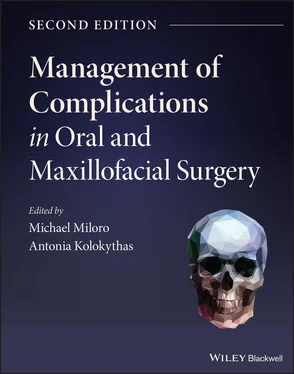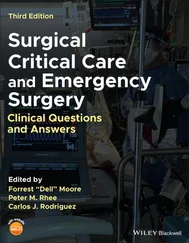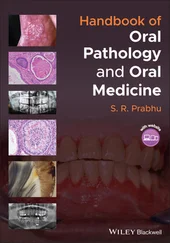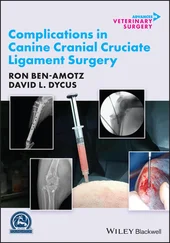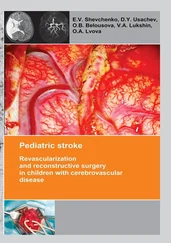Library of Congress Cataloging‐in‐Publication Data applied for
[HB ISBN: 9781119710691]
Cover Design: Wiley
Cover Image: © Natouche/Getty Images, Inc.
To the patients and residents who understand that complications do occur, and that the ability to determine the cause, recognize the problem, and manage it appropriately, leads to prevention of future similar adverse events. The management of surgical complications is an essential, perhaps most critical, component of the education and training of a surgeon.
To Beth and Macy, for your love and support.
MM
To my patients, my trainees and my twins (Michael and Tom)
AK
“Are doctors who make mistakes villains? No, because then we all are.”
“We need practice to get good at what we do. There is one difference in medicine, though: it is people we practice upon.”
— Atul Gawande, “Complications: A Surgeon’s Notes on an Imperfect Science”
It has been said by many surgeons that “we learn more from our complications than from our successes.” A surgical complication should not erode a surgeon’s confidence, but should be used as a learning opportunity in order to prevent similar occurrences in the future and, ultimately, improve patient care. A surgeon is a product of his/her complications, and must recognize, accept, and appropriately manage these problems, in order to improve as a surgeon. Oral and Maxillofacial Surgery is a surgical specialty with a broad scope of practice that is redefined and expanded constantly, and many procedures that we perform may have the potential for minor and/or major complications. The first edition of this book, Management of Complications in Oral and Maxillofacial Surgery was published in 2012, and enjoyed great success amongst resident trainees and practicing surgeons. But, in nearly a decade, the practice patterns and scope of practice has changed such that an update was necessary, so we present, Management of Complications in Oral and Maxillofacial Surgery , 2nd Edition . Our goal is to provide a comprehensive reference textbook, that includes minor and major complications that may be encountered as a result of minor and major surgical procedures in the routine practice of Oral and Maxillofacial Surgery.
The clear purpose of this textbook is to provide a comprehensive, well‐organized, up‐to‐date reference for the management of complications for Oral and Maxillofacial Surgeons that results from procedures performed by and written by Oral and Maxillofacial Surgeons. Management of Complications in Oral and Maxillofacial Surgery , 2nd Edition , provides a systematic approach to complication recognition and management for residents in training as well as clinicians practicing the full and expanded scope of Oral and Maxillofacial Surgery. A new component of the 2nd Edition is the inclusion of Algorithms for management of complications that serve to guide the clinician through various pathways for treatment. Also, this reference textbook is an excellent resource for examination preparation purposes since a solid knowledge base in complication recognition and management is an essential component of clinical practice.
The outstanding surgeon authors for each chapter were chosen based upon their unique training and practices in their specific area of the specialty. These authors should be commended for their willingness to share their poor results and treatment failures in an honest and professional manner. The authors use an evidence‐based approach with a critical evaluation of the current literature, as well as their own clinical experience and expertise, in order to guide their complication management strategy recommendations. The clinical figures and radiographic data used by the authors include patients who have sustained complications, and these serve to augment the manuscript portion of the textbook and provide an illustrative point of view for the clinician. The excellent contributions from each of the authors reflect their extensive experience and in‐depth knowledge in their individual clinical areas of expertise. Each chapter highlights the potential complications encountered during the practice of Oral and Maxillofacial Surgery, from those most commonly encountered to those occurring less often, and from the simple to the more complex problems with which every competent oral and maxillofacial surgeon should be familiar. The authors attempt to focus on the prompt recognition of each complication, consider preventative measures, and describe precise management strategies considering the already compromised clinical circumstances. The authors have done an impressive job of compiling this information in an organized fashion so that it could be presented to the reader in an easy‐to‐read format. We are indebted to the authors, as well as their patients, for providing the case presentations that are essential for this textbook, with the goal of providing an increased knowledge base of all Oral and Maxillofacial Surgeons in training, and, in practice, thereby contributing to the reduction in future patient morbidity.
Michael Miloro
Antonia Kolokythas
Sami Alshihery, BDS, PhDAssistant Professor Oral and Maxillofacial Surgery Biomedical Dental Sciences Department College of Dentistry Imam Abdulrahman Bin Faisal University Dammam, Saudi Arabia
Michael Alterman, DMDDepartment of Oral and Maxillofacial Surgery Hadassah Medical Center Faculty of Dental Medicine Hebrew University of Jerusalem.
Jonathan S. Bailey, DMD, MD, FACSAssociate Clinical Professor and Program Director Division of Oral and Maxillofacial Surgery Division of Head and Neck Cancer Carle Foundation Hospital Urbana, Illinois
R. Bryan Bell, DDS, MD, FACSMedical Director Oral, Head and Neck Cancer Program Providence Cancer Center Portland, Oregon Affiliate Professor Oregon Health & Science University Portland, Oregon Affiliate Assistant Professor University of Washington Seattle, Washington Head and Neck Surgical Associates Portland, Oregon
Carl Bouchard, DMD, MSc, FRCD(C)Oral and Maxillofacial Surgeon Quebec City, Quebec, Canada
Lauren Bourell, DDS, MDOral and Maxillofacial Surgeon Toledo, Ohio
John F. Caccamese, Jr., DMD, MD, FACSAssociate Professor and Program Director Department of Oral and Maxillofacial Surgery University of Maryland Baltimore, Maryland
Nicholas Callahan, MPH, DMD, MDAssistant Professor Department of Oral and Maxillofacial Surgery University of Illinois at Chicago Chicago, Illinois
Eric R. Carlson, DMD, MD, EdM, FACSProfessor and Kelly L. Krahwinkel Chairman Department of Oral and Maxillofacial Surgery University of Tennessee Graduate School of Medicine Knoxville, Tennessee Director Oral/Head and Neck Oncologic Surgery Fellowship Program University of Tennessee Cancer Institute Knoxville, Tennessee
Joseph E. Cillo, Jr., DMD, MPH, PhD, FACSDivision Chief, Residency Program Director, and Director of Research Division of Oral and Maxillofacial Surgery Allegheny General Hospital Pittsburgh, Pennsylvania Associate Professor of Surgery Drexel University School of Medicine Pittsburgh, Pennsylvania
Bernard J. Costello, DMD, MD, FACSProfessor and Program Director Department of Oral and Maxillofacial Surgery University of Pittsburgh School of Dental Medicine Pittsburgh, Pennsylvania Chief, Pediatric Oral and Maxillofacial Surgery Children’s Hospital of Pittsburgh University of Pittsburgh Medical Center Pittsburgh, Pennsylvania
Michael Cummings, MDAssistant Professor Department of Radiation Oncology University of Rochester Medical Center Rochester, New York
Читать дальше
